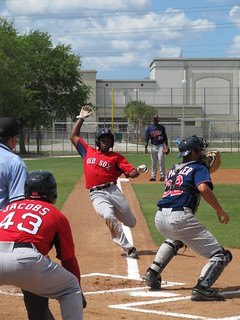There’s talk in Boston these days about whether the Red Sox should send prospect Jackie Bradley, Jr. down to the minor leagues for a few weeks to delay his free agency by one year, potentially saving the team millions of dollars. “It’s good business,” I hear fans saying. So what? Why should Red Sox fans care about making even more money for the owners who’ve made hundreds of millions of dollars from the team?
A summary of the Bradley spring saga from Bleacher Report’s Adam Wells:
This isn’t some young, unproven kid who just had a hot streak in the minors last year and is getting overrated. Bradley has a lot of talent. He really doesn’t need a lot more seasoning in Triple-A before he is ready to make the leap to Fenway.
Cafardo’s article states that people in the baseball operations department would prefer Bradley starts the season in the minors because “he’s only had limited time at Double A, and that his arbitration/free agency clock starts as soon as he’s on the major league roster.”
The Red Sox have never been one to care about delaying free agency and arbitration. It is just a matter of strong-willed people in an organization battling with each other to make a decision.
But if Bradley is one of the 25 best players the Red Sox can bring back from their spring training complex in Lee County, Florida, and they can guarantee him playing time to ensure his development doesn’t stall, what is the problem?
If the Red Sox don’t think Bradley is ready, or think he’d be better served playing every day in Pawtucket than riding the pine at Fenway, that’s understandable. But if the Red Sox cost their fans even a couple of weeks of watching him play just to save money, that would be ridiculous.
There’s no salary cap in baseball so this isn’t like the Wes Welker situation, where the Patriots spending more money on Welker would’ve meant they were forced to spend less on other players. The Red Sox can spend as much as they’d like and the only real constraint is their profit margin, which has been incredibly healthy.
The Red Sox have turned a $90 million total profit over the last four years, but that’s not where the real money is in this banana stand. The John Henry-led group bought the Red Sox in 2003 for about $400 million and Forbes now estimates the team is worth $1 billion.
My point is not to begrudge the Red Sox for making money. They’ve done it by fielding (mostly) competitive teams and improving the fan experience at an aging but much beloved park. If the Red Sox want to save money on Bradley, that’s their decision.
My point is that sports fans worry so much about trying to seem savvy that they buy into things like “not getting to watch Jackie Bradley for two weeks” like they’re a good thing for everyone. Unless you own stock in the team, it stinks!
If you went to a Broadway show and one of the stars didn’t appear because of a contract dispute, would people who paid full price for tickets nod solemnly and say it was a good business decision? Of course not – they’d be understandably angry. The Bradley case is no different.
If the Sox do send Bradley down and you have tickets to a game in April, you will not receive an I Didn’t Get To See Jackie Bradley discount. It may be good business, but it’s bad for fans, and it’s OK to be mad about that.

a fair argument he’s not ready. He’s doing exceptionally well during spring training, but that doesn’t always translate to the major league regular season. Unlike most players who come up, he has not played many games at the AAA level.
This kind of thing – keeping someone in the minors for April – is common practice for most teams. In the past the Red Sox generally haven’t bothered since they cared more about winning than saving money. You say there’s no salary cap, which is true. but MLB has raised the luxury tax dramatically for teams over a certain payroll threshold. That has made the Red Sox, and even the Yankees, much more cost-conscious.
They’ve also set a structure for signing bonuses based on draft position, eliminating a competitive advantage for rich teams like the Sox. In the old system “poor” teams would pass on excellent high school players who’d indicated they intended to go to college. The Sox would draft those players, blow them away with a signing bonus offer, and sign most of them.
MLB players make a lot less in their “first” three years, and a lot more after free agency, which happens only after six years of service. So delaying the start of the clock may cost him millions. It also increases the risk the player will get injured before getting to the big(ger) paycheck. I will say I’m not too worried about Jackie Bradley’s financial future, but these players often have short careers and it can make a big difference. If I were with the player’s union, changing the system to eliminate this kind of abuse would be high on my list.